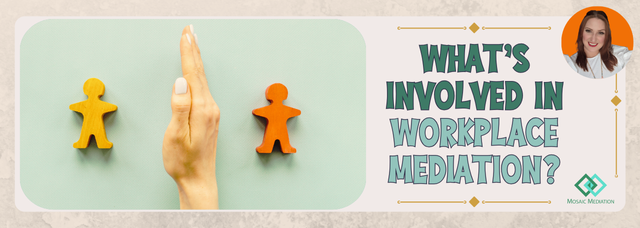What’s Involved in Workplace Mediation?
Answering the focal question: What happens in a workplace and employment mediation process?
After, the initial response to finding out I am a mediator (“Oh, how fascinating! You must have seen some interesting situations!”) …there tend to be 4 main questions people have when they are deciding whether to use workplace and employment mediation to resolve a situation in their organisation:
What’s involved in a mediation? How long does mediation take? What does mediation cost? Does workplace and employment mediation actually work?
I’ll address each of these concerns:
a) What’s involved?
Normally this is how a mediation comes about… There are 2 or more people at odds with each other in a company. This could include: an argument between colleagues; a difficult relationship between a manager and an employee; the start of a grievance/disciplinary procedure; bullying and harassment allegations; or figuring out the return-to-work transition.
The organisation is often very aware of the immense cost, company time and stress that is often involved in legal procedures (especially if it came to the employment tribunal). They also often want to see if mediation can do anything to improve the relationships or resolve the issues; so that the situation remains as positive as possible.
The team leader, HR lead, a director or the CEO will then contact me to understand more about mediation. In so many words, this is how I tend to describe it: “Mediation is a way of helping individuals get the chance to be heard and to hear another perspective. I facilitate a conversation between them so that they each come away having hopefully learnt something new about themselves, the other person, and the situation. I then help them think through potential options to move the situation positively forward, and then come to an agreement that everyone is happy with.”
The process itself:
Before the mediation , I speak to each person who will be there to get their perspective and get them prepared for the day. Often, there is a sense of people both feeling misunderstood and wanting to understand WHY someone behaved they way they did.
We either book a date for online mediation , or we book a date and venue that’s appropriate for face-to-face mediation .
During the day , I tend to do a mixture of joint conversations with everyone and private conversations. I only divulge information from those conversations if: the person has specifically agreed to it being shared AND I think it would be helpful to do so.
Mediation is confidential (so if necessary, only those involved in the different discussions will know what was said). Mediation is ‘without prejudice’ (so nothing said can be used as evidence in a legal proceeding). Mediation is also voluntary (so if one person isn’t up for it, it doesn’t happen, and an individual can leave at any time). It also doesn’t affect anyone’s legal rights (so, if for whatever reason it doesn’t help a situation, people are not forfeiting anything by agreeing to mediate).
As the mediator, I am totally neutral and do not give legal advice . So, any agreement that the individuals come to is what THEY want. My role is to facilitate the session by asking questions, getting individuals to reflect and see things from different angles and I encourage them to engage with the process – knowing from experience that the more they do, the better the outcome!
If we reach the point of agreement, the individuals can decide who sees it – if anyone else at all – and all the wording is theirs. I just make sure that the mediation agreement makes sense and any points of action actually can be ‘actioned’ – both practically and within legal/company guidelines.
I then do a follow-up call 6-8 weeks later to make sure everything is going smoothly, or if any other support is required – such as 1:1 coaching, training, etc.
b) How long does mediation take?
Generally, for workplace and employment mediation, it is done over the course of a working day. (Sometimes it is over by mid-afternoon.) With online mediation, the time can be less due to no travel time allowances. (Online mediation for small business mediation tends to be around 1-3 hours – so can be done outside ‘regular working hours’.)
c) What does mediation cost?
For workplace and employment mediation, Mosaic Mediation charges a fee that is inclusive of the pre-mediation calls, the mediation and the catch-up calls. The organisation covers the mediation fee for workplace mediation. (For small business mediation, there is an hourly rate.) There is also a reduced rate for online mediations. Click here for our updated fees.
d) Does workplace and employment mediation actually work?
In short, yes. Not always… but for the greater majority of mediations (the average for most mediation organisations is between 75-85% settlement rate) , individuals are able to reach the point of agreement. For me, the true sign of ‘success’ is also hearing the positive changes that have occurred since the mediation, during my follow-up calls.
Even if a mediation does not reach the point of agreement, I would argue that the process itself is so effective at providing clarity and new perspectives, that it has the potential to still improve a situation.
This is why I remain passionate about the benefits of mediation. Legal procedures have their place in the organisations. Mediation is an alternative that has so many emotional, cost and time advantages. It is extraordinary what positive transformations can be achieved over the course of a day, compared to the months (or years) that legal procedures can take.
Book a call to discuss any situation involving members of your team or organisation that is causing you stress, worry or concern. It is likely that mediation can help.
Find out more about the different services, Mosaic Mediation can offer here. Or, contact enquiries@mosaicmediation.co.uk.











